形容词比较级和最高级的构成和用法
形容词的比较级最高级用法小结
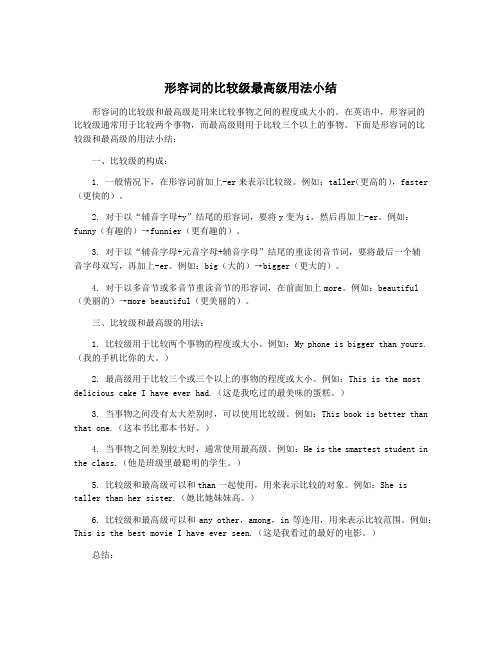
形容词的比较级最高级用法小结形容词的比较级和最高级是用来比较事物之间的程度或大小的。
在英语中,形容词的比较级通常用于比较两个事物,而最高级则用于比较三个以上的事物。
下面是形容词的比较级和最高级的用法小结:一、比较级的构成:1. 一般情况下,在形容词前加上-er来表示比较级。
例如:taller(更高的),faster (更快的)。
2. 对于以“辅音字母+y”结尾的形容词,要将y变为i,然后再加上-er。
例如:funny(有趣的)→funnier(更有趣的)。
3. 对于以“辅音字母+元音字母+辅音字母”结尾的重读闭音节词,要将最后一个辅音字母双写,再加上-er。
例如:big(大的)→bigger(更大的)。
4. 对于以多音节或多音节重读音节的形容词,在前面加上more。
例如:beautiful (美丽的)→more beautiful(更美丽的)。
三、比较级和最高级的用法:1. 比较级用于比较两个事物的程度或大小。
例如:My phone is bigger than yours.(我的手机比你的大。
)2. 最高级用于比较三个或三个以上的事物的程度或大小。
例如:This is the most delicious cake I have ever had.(这是我吃过的最美味的蛋糕。
)3. 当事物之间没有太大差别时,可以使用比较级。
例如:This book is better than that one.(这本书比那本书好。
)4. 当事物之间差别较大时,通常使用最高级。
例如:He is the smartest student in the class.(他是班级里最聪明的学生。
)5. 比较级和最高级可以和than一起使用,用来表示比较的对象。
例如:She istaller than her sister.(她比她妹妹高。
)6. 比较级和最高级可以和any other,among,in等连用,用来表示比较范围。
形容词的比较级和最高级的构成和用法
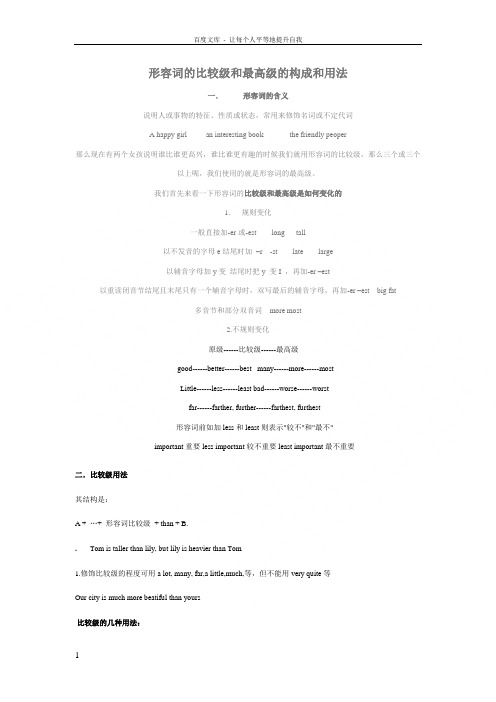
形容词的比较级和最高级的构成和用法一.形容词的含义说明人或事物的特征、性质或状态,常用来修饰名词或不定代词A happy girl an interesting book the friendly peoper那么现在有两个女孩说明谁比谁更高兴,谁比谁更有趣的时候我们就用形容词的比较级,那么三个或三个以上呢,我们使用的就是形容词的最高级。
我们首先来看一下形容词的比较级和最高级是如何变化的1.规则变化一般直接加-er或-est long tall以不发音的字母e结尾时加–r -st late large以辅音字母加y变结尾时把y 变I ,再加-er –est以重读闭音节结尾且末尾只有一个辅音字母时,双写最后的辅音字母,再加-er –est big fat多音节和部分双音词more most2.不规则变化原级------比较级------最高级good------better------best many------more------mostLittle------less------least bad------worse------worstfar------farther, further------farthest, furthest形容词前如加 less 和 least 则表示"较不"和"最不"important 重要 less important 较不重要 least important 最不重要二.比较级用法其结构是:A + …+ 形容词比较级+ than + B..Tom is taller than lily, but lily is heavier than Tom1.修饰比较级的程度可用a lot, many, far,a little,much,等,但不能用very quite等Our city is much more beatiful than yours比较级的几种用法:1.表示倍数,A+…….+数词+times+形容词比较级+than+BOur room is twice larger than theirs.我们的房间是他们的两倍大注:两倍为twice而不是two times.2.表示大多少,多多少,高多少等A+……+数量词+比较级+than+BShe is two years older than me她比我大两岁他比班上其他的同学都高。
形容词的比较级最高级用法小结

形容词的比较级最高级用法小结形容词的比较级和最高级是用来表示不同物品或人的程度或质量的不同。
比较级用于两个事物之间的比较,最高级用于三个或三个以上事物之间的比较。
以下是形容词比较级和最高级的用法小结。
一、比较级的用法1. 比较级用于两个事物之间的比较,表示其中一个事物在某一方面比另一个事物更高或更好。
例如:- My car is faster than yours.(我的车比你的车更快)- She is taller than her sister.(她比她的妹妹更高)2. 比较级的构成方法:- 单音节和少数双音节形容词,在词尾加-er。
如:big - bigger(大 - 更大)、fast - faster(快 - 更快)- 以字母“e”结尾的形容词,在词尾加-r。
如:late - later(晚 - 更晚)- 以“辅音字母+y”结尾的形容词,变“y”为“i”,再加-er。
如:happy - happier(快乐 - 更快乐)- 多音节形容词和部分双音节形容词在前面加more或less。
如:beautiful - more beautiful(美丽 - 更美丽)、interesting - less interesting(有趣 - 不那么有趣)3. 特殊形式的比较级:- 不规则形式:如:good - better(好 - 更好)、bad - worse(坏 - 更坏)- 比较级是most或least的形容词:如:most modern(最现代的)、least important(最不重要的)三、注意事项1. 形容词比较级和最高级前可以加上much或even来表示程度的加强。
例如:- The weather is much colder today.(今天的天气要冷得多)- She is the most intelligent student in the school, even better than the teachers.(她是学校里最聪明的学生,甚至比老师还聪明)。
形容词的比较级最高级用法小结

形容词的比较级最高级用法小结形容词的比较级是用来比较两个事物的程度或者质量的。
比较级分为原级、比较级和最高级三个等级。
原级用于描述一个事物的程度或质量,比较级用于比较两个事物的程度或质量,最高级则用于表示三个或三个以上事物之中程度或质量最高的。
形容词比较级的构成方法和规则有以下几种:1. 单音节形容词和部分双音节形容词在比较级前面加上-er或者-more来构成比较级,最高级前面加上-est或者-most来构成最高级。
例如:big(大)- bigger(更大)- biggest (最大); tall(高)- taller(更高)- tallest(最高); pretty(漂亮)- prettier (更漂亮)- prettiest(最漂亮)。
2. 以辅音字母+y结尾的形容词,将y变为i,然后再加上-er或者-est来构成比较级和最高级。
例如:happy(高兴)- happier(更高兴)- happiest(最高兴);busy(忙碌)- busier(更忙碌)- busiest(最忙碌)。
3. 以字母e结尾的形容词,直接在后面加上-r或者-st来构成比较级和最高级。
例如:large(大)- larger(更大)- largest(最大)。
5. 有些形容词的比较级和最高级是不规则的,需要进行记忆。
例如:good(好)- better(更好)- best(最好);bad(坏)- worse(更坏)- worst(最坏);far(远)- farther/further(更远)- farthest/furthest(最远)。
1. 用于比较两个事物的程度或质量。
例如:She is taller than her sister(她比她姐姐高)。
2. 用于表示某一事物在某一特定方面要比另一事物更好或更差。
例如:This book is more interesting than that one(这本书比那本书更有趣)。
形容词比较级和最高级的用法

形容词比较级和最高级的用法一、形容词比较级形容词比较级是一种级别,它指示两个事物之间的比较程度。
如:taller(更高),wider(更宽),faster(更快)等。
二、形容词比较级的构成1、长形容词比较级一般形容词后缀加-er构成比较级,如:tall(高)→ taller(更高)2、以e结尾的形容词比较级以e结尾的形容词后缀加-r构成比较级,如:wise(聪明)→ wiser (更聪明)3、以辅音字母+y结尾的形容词比较级以辅音字母+y结尾的形容词变y为i再加-er,如:busy(忙碌)→ busier(更忙碌)4、双音节与多音节形容词的比较级双音节形容词直接加“more”来构成比较级,如:beautiful(美丽)→ more beautiful(更美丽);多音节形容词直接加“most”来构成比较级,如:careful(小心)→ most careful(最小心)三、形容词最高级形容词最高级,指对三者或三者以上时,表示最高或最多的程度。
通常加上“the”,再加最高级后缀-est或more/most来构成。
1、以-y结尾的形容词最高级以-y结尾的形容词,先把-y变成i,再加-est,如:happy(高兴)→ happiest(最高兴)2、以辅音字母+y结尾的形容词最高级以辅音字母+y结尾的形容词,变y为i,再加-est,如:busy(忙碌)→ busiest(最忙碌)3、以e结尾的形容词最高级以e结尾的形容词,后面直接加-st,如:nice(好)→ nicest(最好的)4、一个音节或双音节的形容词最高级一个音节或双音节的形容词,直接加“the”,再加most来构成,如:high(高)→ the highest(最高);nice(好)→ the nicest(最好的)。
形容词的比较级与最高级

形容词的比较级与最高级形容词是用来描述人、事物特征或性质的词语。
而形容词的比较级和最高级则用于在不同程度上比较事物之间的差异,表达出更具体的概念。
本文将为读者介绍形容词的比较级和最高级的用法,并探讨其在句子中的运用。
一、比较级的构成比较级用于比较两个人或物的差异,它的构成方式如下:1. 单音节词:在形容词前加上-er,如"tall(高)→ taller(更高)"。
2. 双音节词或多音节词:在形容词前加上more,如"beautiful(美丽)→ more beautiful(更美丽)"。
二、比较级的用法比较级的用法主要有以下几种:1. 表示人或物在某一方面的差异:如"Tom is taller than Mike"(汤姆比迈克高)。
2. 表示相对程度:如"She is more intelligent than her classmates"(她比她的同学更聪明)。
3. 表示越来越:如"The weather is getting colder and colder"(天气越来越冷)。
4. 与than连用,表示一个被比较的对象:如"I have more friends than you"(我有比你更多的朋友)。
三、最高级的构成最高级用于比较三个或三个以上的人或物,它的构成方式如下:1. 单音节词在形容词前加上-est,如"tall(高)→ tallest(最高)"。
2. 双音节词或多音节词在形容词前加上most,如"beautiful(美丽)→ most beautiful(最美丽)"。
四、最高级的用法最高级的用法主要有以下几种:1. 表示最高程度:如"He is the tallest boy in our class"(他是我们班最高的男生)。
形容词的比较级最高级用法小结
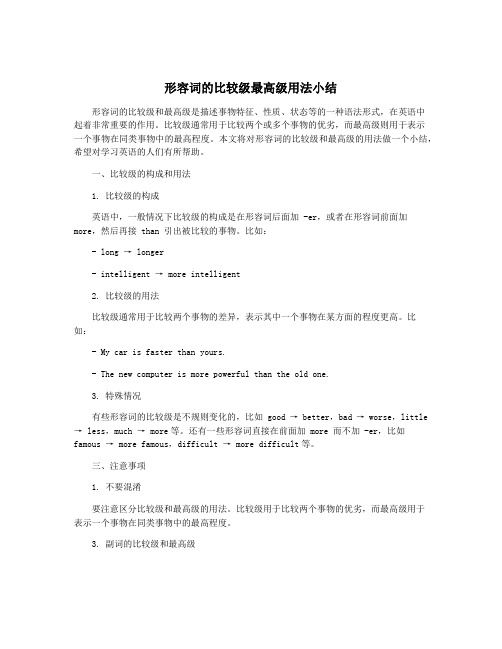
形容词的比较级最高级用法小结形容词的比较级和最高级是描述事物特征、性质、状态等的一种语法形式,在英语中起着非常重要的作用。
比较级通常用于比较两个或多个事物的优劣,而最高级则用于表示一个事物在同类事物中的最高程度。
本文将对形容词的比较级和最高级的用法做一个小结,希望对学习英语的人们有所帮助。
一、比较级的构成和用法1. 比较级的构成英语中,一般情况下比较级的构成是在形容词后面加 -er,或者在形容词前面加more,然后再接 than 引出被比较的事物。
比如:- long → longer- intelligent → more intelligent2. 比较级的用法比较级通常用于比较两个事物的差异,表示其中一个事物在某方面的程度更高。
比如:- My car is faster than yours.- The new computer is more powerful than the old one.3. 特殊情况有些形容词的比较级是不规则变化的,比如good → better,bad → worse,little → less,much → more等。
还有一些形容词直接在前面加 more 而不加 -er,比如famous → more famous,difficult → more difficult等。
三、注意事项1. 不要混淆要注意区分比较级和最高级的用法。
比较级用于比较两个事物的优劣,而最高级用于表示一个事物在同类事物中的最高程度。
3. 副词的比较级和最高级与形容词一样,副词也有比较级和最高级的变化,只是它们的构成方式不同。
一般情况下副词的比较级在其原形后面加上 -er,或者在其原形前面加 more,最高级在其原形前面加上 the most。
形容词比较级和最高级的用法
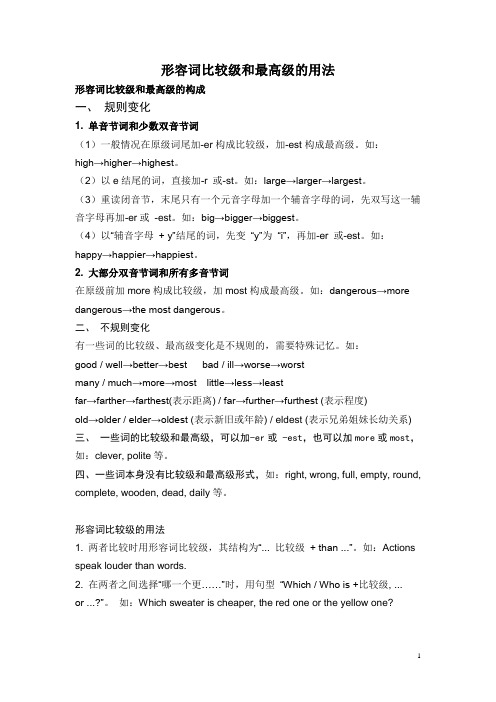
形容词比较级和最高级的用法形容词比较级和最高级的构成一、规则变化1. 单音节词和少数双音节词(1)一般情况在原级词尾加-er构成比较级,加-est构成最高级。
如:high→higher→highest。
(2)以e结尾的词,直接加-r 或-st。
如:large→larger→largest。
(3)重读闭音节,末尾只有一个元音字母加一个辅音字母的词,先双写这一辅音字母再加-er或-est。
如:big→bigger→biggest。
(4)以“辅音字母+ y”结尾的词,先变“y”为“i”,再加-er 或-est。
如:happy→happier→happiest。
2. 大部分双音节词和所有多音节词在原级前加more构成比较级,加most构成最高级。
如:dangerous→more dangerous→the most dangerous。
二、不规则变化有一些词的比较级、最高级变化是不规则的,需要特殊记忆。
如:good / well→better→best bad / ill→worse→worstmany / much→more→most little→less→leastfar→farther→farthest(表示距离) / far→further→furthest (表示程度)old→older / elder→oldest (表示新旧或年龄) / eldest (表示兄弟姐妹长幼关系) 三、一些词的比较级和最高级,可以加-er或 -est,也可以加more或most,如:clever, polite等。
四、一些词本身没有比较级和最高级形式,如:right, wrong, full, empty, round, complete, wooden, dead, daily等。
形容词比较级的用法1. 两者比较时用形容词比较级,其结构为“... 比较级+ than ...”。
如:Actions speak louder than words.2. 在两者之间选择“哪一个更……”时,用句型“Which / Who is +比较级, ...or ...?”。
知识点形容词的比较级和最高级
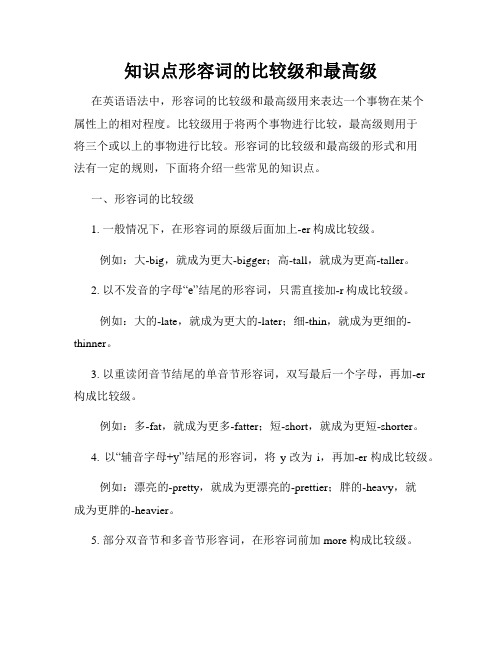
知识点形容词的比较级和最高级在英语语法中,形容词的比较级和最高级用来表达一个事物在某个属性上的相对程度。
比较级用于将两个事物进行比较,最高级则用于将三个或以上的事物进行比较。
形容词的比较级和最高级的形式和用法有一定的规则,下面将介绍一些常见的知识点。
一、形容词的比较级1. 一般情况下,在形容词的原级后面加上-er构成比较级。
例如:大-big,就成为更大-bigger;高-tall,就成为更高-taller。
2. 以不发音的字母“e”结尾的形容词,只需直接加-r构成比较级。
例如:大的-late,就成为更大的-later;细-thin,就成为更细的-thinner。
3. 以重读闭音节结尾的单音节形容词,双写最后一个字母,再加-er构成比较级。
例如:多-fat,就成为更多-fatter;短-short,就成为更短-shorter。
4. 以“辅音字母+y”结尾的形容词,将y改为i,再加-er构成比较级。
例如:漂亮的-pretty,就成为更漂亮的-prettier;胖的-heavy,就成为更胖的-heavier。
5. 部分双音节和多音节形容词,在形容词前加more构成比较级。
例如:有趣的-interesting,就成为更有趣的-more interesting;美丽的-beautiful,就成为更美丽的-more beautiful。
二、形容词的最高级1. 一般情况下,在形容词的原级后面加上-est构成最高级。
例如:大-big,就成为最大-biggest;高-tall,就成为最高-tallest。
2. 以不发音的字母“e”结尾的形容词,只需直接加-st构成最高级。
例如:大的-late,就成为最大的-latest;细-thin,就成为最细的-thinnest。
3. 以重读闭音节结尾的形容词,双写最后一个字母,再加-est构成最高级。
例如:多-fat,就成为最多-fattest;短-short,就成为最短-shortest。
形容词的比较级最高级用法小结
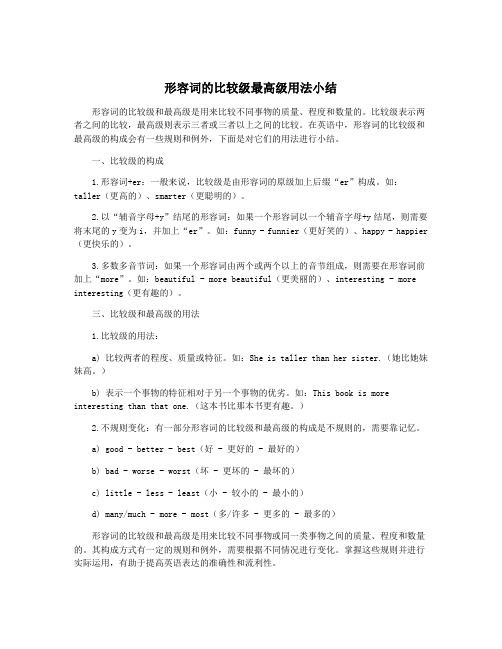
形容词的比较级最高级用法小结形容词的比较级和最高级是用来比较不同事物的质量、程度和数量的。
比较级表示两者之间的比较,最高级则表示三者或三者以上之间的比较。
在英语中,形容词的比较级和最高级的构成会有一些规则和例外,下面是对它们的用法进行小结。
一、比较级的构成1.形容词+er:一般来说,比较级是由形容词的原级加上后缀“er”构成。
如:taller(更高的)、smarter(更聪明的)。
2.以“辅音字母+y”结尾的形容词:如果一个形容词以一个辅音字母+y结尾,则需要将末尾的y变为i,并加上“er”。
如:funny - funnier(更好笑的)、happy - happier (更快乐的)。
3.多数多音节词:如果一个形容词由两个或两个以上的音节组成,则需要在形容词前加上“more”。
如:beautiful - more beautiful(更美丽的)、interesting - more interesting(更有趣的)。
三、比较级和最高级的用法1.比较级的用法:a) 比较两者的程度、质量或特征。
如:She is taller than her sister.(她比她妹妹高。
)b) 表示一个事物的特征相对于另一个事物的优劣。
如:This book is more interesting than that one.(这本书比那本书更有趣。
)2.不规则变化:有一部分形容词的比较级和最高级的构成是不规则的,需要靠记忆。
a) good - better - best(好 - 更好的 - 最好的)b) bad - worse - worst(坏 - 更坏的 - 最坏的)c) little - less - least(小 - 较小的 - 最小的)d) many/much - more - most(多/许多 - 更多的 - 最多的)形容词的比较级和最高级是用来比较不同事物或同一类事物之间的质量、程度和数量的。
形容词的比较级最高级用法小结

形容词的比较级最高级用法小结形容词是用来描述事物特征和性质的。
为了更精准、生动地表达事物的特点,人们常常使用比较级和最高级来对形容词进行修饰。
本文将对形容词的比较级和最高级的用法进行总结,以帮助英语学习者更好地掌握这一语法知识点。
一、比较级的用法比较级是用来表示两个事物之间的比较,表达“更”的含义。
比较级的构成方法如下:1.单音节形容词及少数双音节形容词在词尾加er。
例如:tall(高)— taller(更高);big(大)—bigger(更大)。
2.以“字母元音字母”结尾的双音节形容词,在词尾加er。
例如:nice(好的)—nicer(更好的);fine(好的)—finer(更好的)。
例如:happy(快乐的)—happier(更快乐的);pretty(漂亮的)—prettier(更漂亮的)。
5.部分多音节形容词在前面加more,例如:interesting(有趣的)—more interesting(更有趣的)。
1.表示一种增加或减少,如:deep(深)—deeper(更深)、low(低)—lower(更低)。
3.用于比较同类事物之间的差异,如:The red apple is sweeter than the green one.(红色的苹果比绿色的苹果更甜)。
最高级的用法:1.表示同一类型或同一类事物中最高的,如:This is the tallest building inthe world.(这是世界上最高的建筑)。
总结:比较级和最高级常常用于对事物的大小、高低、好坏等性质进行比较和评价,因此在英语表达中非常常见。
正确使用比较级和最高级,不仅可以提高语言表达的清晰度和精确度,还能够充分表达出说话人的感情态度。
因此,我们需要在日常学习、使用英语中多加练习和积累,以达到熟练运用比较级和最高级的能力。
形容词比较级和最高级的用法总结

形容词比较级和最高级的用法总结大多数形容词和副词有比较级和最高级的变化,即原级、比较级和最高级,用来表示事物的等级差别。
今天店铺在这里为大家介绍形容词比较级和最高级的用法总结,欢迎大家阅读!形容词比较级和最高级的用法篇一1. 规则变化1)单音节词和少数双音节词,加词尾-er,-est来构成比较级和最高级。
构成法原级比较级最高级一般单音节词末尾加-er,-est tall(高的) taller tallest great(巨大的) greater greatest2)以不发音的e结尾和以- le结尾的双音节词只加-r,-st nice(好的) nicer nicest ,able(有能力的) abler ablest3)以一个辅音字母结尾的闭音节单音节词,双写结尾的辅音字母,再加-er,-est big(大的) bigger biggest hot热的) hotter hottest4)"以辅音字母+y"结尾的双音节词改y为i,再加 -er,-esteasy(容易的) easier easiest ,busy(忙的) busier busiest5)少数以-er,-ow 结尾的双音节词末尾加-er,-est clever(聪明的) cleverer cleverest narrow(窄的) narrower narrowest6)其他双音节词和多音节词,在前面加more,most 来构成比较级和最高级important(重要的) more important most important easily(容易的) more easily most easily2. 不规则变化原级比较级最高级good(好的)/ better best well(健康的) bad (坏的)/ worse worst ill(有病的) old (老的) older/elder oldest/eldest much/many(多的) more most little(少的) less least far (远的) farther/further farthest/furthest3.比较级形容词或副词 + than You are taller than I. They lights in your room are as bright as those in mine. 注意:1)要避免重复使用比较级。
英语比较级和最高级的用法归纳

英语比较级和最高级的用法归纳英语中的形容词比较级和最高级是用来比较两个或多个事物的等级。
了解这些等级的用法对于正确使用比较级和最高级是非常重要的。
下面是关于比较级和最高级用法的详细归纳。
1.比较级的构成:在英语中,比较级的构成主要有以下几种形式:a) 在形容词的后面加上 -er 或者在前面加上 more,例如:bigger或者 more interesting;b) 在双音节和多音节形容词前面加上 more,例如:more beautiful;c) 一些特殊的形容词有自己的比较级形式,例如:good-better、bad-worse、far-further/farther。
2.最高级的构成:最高级的构成主要有以下几种形式:a) 在形容词的后面加上 -est 或在前面加上 most,例如:biggest或者 most interesting;b) 双音节和多音节形容词前面加上 most,例如:most beautiful;c) 一些特殊的形容词有自己的最高级形式,例如:good-best、bad-worst、far-furthest/farthest。
3.比较级的用法:a) 在比较级的句子中,被比较的两个事物之间需要用 than 连接,例如:He is taller than his brother.b) 当表示两个事物之间的比较时,通常比较级的形式是正确的选择,例如:The book is more interesting than the movie.c) 当表示比较级的范围时,可以使用连词比较级来形容范围的两个极端,例如:The weather is getting colder and colder.4.最高级的用法:a) 在最高级的句子中,需要明确表示参照物,通过使用介词形式来连接参照物与所比较的事物,例如:She is the tallest girl in the class.b) 最高级也可以用来表示一种特定的属性,而不是与其他事物进行比较,例如:It is the most beautiful place I've ever seen.c) 当表示最高级时,可以使用 only 或者 one of the + 最高级的形式来强调其独特性,例如:She is the only one of her friends who can play the piano.5.特殊用法和注意事项:a) 有些形容词的比较级和最高级形式是不规则的,需要特殊记忆,例如:good-better-best、bad-worse-worst、far-further/farther-furthest/farthest。
形容词的比较级最高级用法小结

形容词的比较级最高级用法小结形容词的比较级和最高级是英语中常用的语法结构,用来对两个或多个事物进行比较和表达最高程度的描述。
掌握好比较级和最高级的用法,能够让我们的表达更加准确和生动。
本文将对形容词的比较级和最高级的用法进行小结,帮助读者更好地理解和运用这一语法知识。
一、比较级的用法1. 比较级的构成比较级的构成方式一般是在形容词后面加上-er或者在形容词前加上more,例如:taller, more beautiful。
在构成比较级时,单音节词一般直接在词尾加-er,多音节词则需要在前面加上more。
比较级用来表示两者之间的比较,通常使用than来引导比较的对象,例如:My house is bigger than yours. 意为“我的房子比你的大”。
有些形容词的比较级形式有些特殊,需要记住其规则变化,例如good的比较级是better,bad的比较级是worse等。
2. 最高级的用法三、比较级和最高级的不规则形式除了上述提到的一般规则外,还有一些形容词的比较级和最高级形式是不规则的,需要特殊记忆,例如:原级比较级最高级good better bestbad worse worstfar farther farthest/furthestlittle less leastmuch/many more mostold older oldest四、注意事项1. 注意形容词原级的拼写变化,比如以“y”结尾的形容词比较级直接变成“ier”,最高级变成“iest”;2. 在使用比较级和最高级时,需要明确比较的对象,并使用合适的介词来引导;3. 特殊情况需要牢记,例如good和bad等形容词的比较级和最高级的不规则变化;4. 以上规则只针对一般的形容词,对于复合形容词和副词的比较级和最高级形式,需要根据具体情况进行变化。
通过对比较级和最高级的小结,相信读者对于这一语法知识有了更深入的理解。
在实际运用中,我们需要不断积累词汇,灵活运用比较级和最高级,从而使我们的表达更加生动和精准。
比较级与最高级的形容词用法
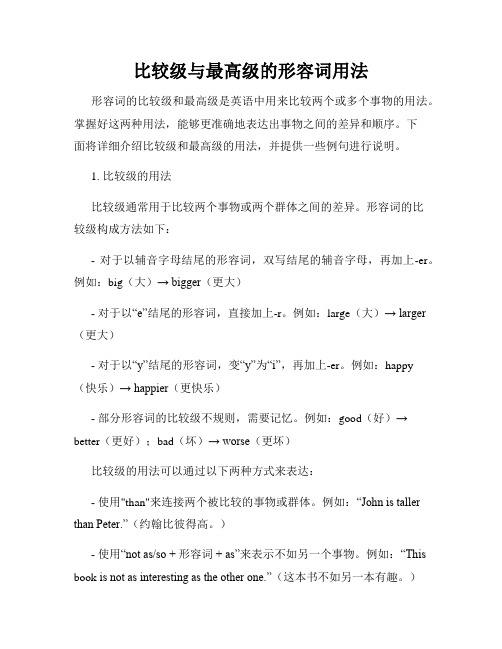
比较级与最高级的形容词用法形容词的比较级和最高级是英语中用来比较两个或多个事物的用法。
掌握好这两种用法,能够更准确地表达出事物之间的差异和顺序。
下面将详细介绍比较级和最高级的用法,并提供一些例句进行说明。
1. 比较级的用法比较级通常用于比较两个事物或两个群体之间的差异。
形容词的比较级构成方法如下:- 对于以辅音字母结尾的形容词,双写结尾的辅音字母,再加上-er。
例如:big(大)→ bigger(更大)- 对于以“e”结尾的形容词,直接加上-r。
例如:large(大)→ larger (更大)- 对于以“y”结尾的形容词,变“y”为“i”,再加上-er。
例如:happy(快乐)→ happier(更快乐)- 部分形容词的比较级不规则,需要记忆。
例如:good(好)→ better(更好);bad(坏)→ worse(更坏)比较级的用法可以通过以下两种方式来表达:- 使用"than"来连接两个被比较的事物或群体。
例如:“John is taller than Peter.”(约翰比彼得高。
)- 使用“not as/so + 形容词+ as”来表示不如另一个事物。
例如:“This book is not as interesting as the other one.”(这本书不如另一本有趣。
)以下是一些比较级用法的例句:- China is larger than Japan.(中国比日本大。
)- This car is faster than that one.(这辆车比那辆车快。
)- She is older than her sister.(她比她妹妹大。
)2. 最高级的用法最高级用于比较三个或三个以上的事物或群体之间的差异,表示其中的一个事物或群体在某一方面是最好的或最差的。
形容词的最高级构成方法如下:- 对于以辅音字母结尾的形容词,双写结尾的辅音字母,再加上-est。
形容词比较级和最高级的构成与用法
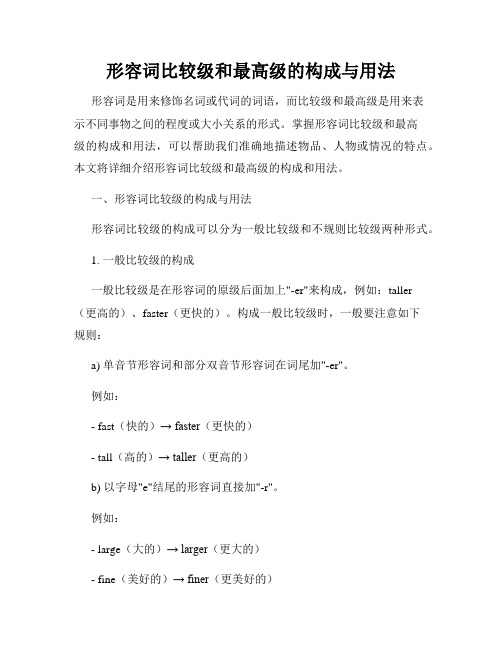
形容词比较级和最高级的构成与用法形容词是用来修饰名词或代词的词语,而比较级和最高级是用来表示不同事物之间的程度或大小关系的形式。
掌握形容词比较级和最高级的构成和用法,可以帮助我们准确地描述物品、人物或情况的特点。
本文将详细介绍形容词比较级和最高级的构成和用法。
一、形容词比较级的构成与用法形容词比较级的构成可以分为一般比较级和不规则比较级两种形式。
1. 一般比较级的构成一般比较级是在形容词的原级后面加上"-er"来构成,例如:taller(更高的)、faster(更快的)。
构成一般比较级时,一般要注意如下规则:a) 单音节形容词和部分双音节形容词在词尾加"-er"。
例如:- fast(快的)→ faster(更快的)- tall(高的)→ taller(更高的)b) 以字母"e"结尾的形容词直接加"-r"。
例如:- large(大的)→ larger(更大的)- fine(美好的)→ finer(更美好的)c) 以辅音字母加"y"结尾的形容词,变"y"为"i",然后加"-er"。
例如:- happy(快乐的)→ happier(更快乐的)- busy(忙碌的)→ busier(更忙碌的)2. 不规则比较级的构成不规则比较级是指一些形容词比较级的构成不遵循一般规则,需要单独记忆和使用。
例如:- good(好的)→ better(更好的)- bad(坏的)→ worse(更坏的)- little(小的)→ less(更小的)一般比较级的用法主要有以下几种情况:a) 比较两个物品或人物的特征或性质,并表示它们之间的差异。
例如:- His car is faster than mine.(他的车比我的快。
)- This book is more interesting than that one.(这本书比那本书更有趣。
形容词比较级和最高级用法
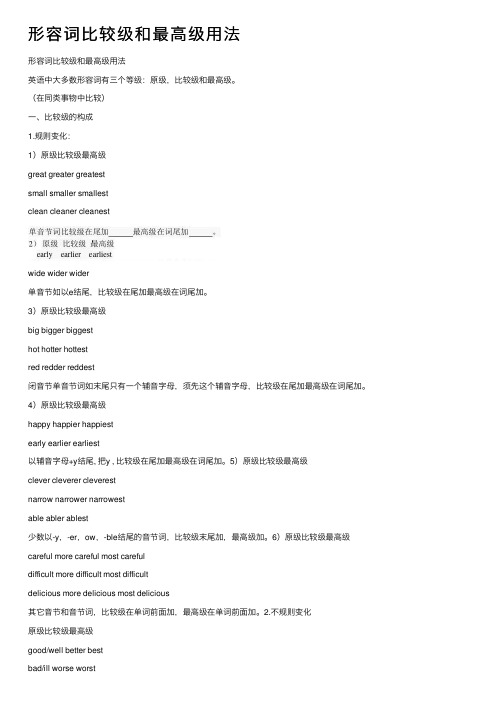
形容词⽐较级和最⾼级⽤法形容词⽐较级和最⾼级⽤法英语中⼤多数形容词有三个等级:原级,⽐较级和最⾼级。
(在同类事物中⽐较)⼀、⽐较级的构成1.规则变化:1)原级⽐较级最⾼级great greater greatestsmall smaller smallestclean cleaner cleanestwide wider wider单⾳节如以e结尾,⽐较级在尾加最⾼级在词尾加。
3)原级⽐较级最⾼级big bigger biggesthot hotter hottestred redder reddest闭⾳节单⾳节词如末尾只有⼀个辅⾳字母,须先这个辅⾳字母,⽐较级在尾加最⾼级在词尾加。
4)原级⽐较级最⾼级happy happier happiestearly earlier earliest以辅⾳字母+y结尾, 把y , ⽐较级在尾加最⾼级在词尾加。
5)原级⽐较级最⾼级clever cleverer cleverestnarrow narrower narrowestable abler ablest少数以-y,-er,ow,-ble结尾的⾳节词,⽐较级末尾加,最⾼级加。
6)原级⽐较级最⾼级careful more careful most carefuldifficult more difficult most difficultdelicious more delicious most delicious其它⾳节和⾳节词,⽐较级在单词前⾯加,最⾼级在单词前⾯加。
2.不规则变化原级⽐较级最⾼级good/well better bestbad/ill worse worstmany/much more mostlittle less leastfar farther/further farthest/furthest注:less important least important形容词前如加less 和least 则表⽰" "和" "。
形容词的比较级和最高级

形容词的比较级和最高级形容词的比较级和最高级一、比较级1.定义:比较级是用来比较两个事物之间的差异或程度。
通常,我们使用形容词的比较级来表示“更”或“较”的概念。
2.构成规则:大多数形容词的比较级可以通过加-er后缀来构成。
例如:good - betterbad - worseold - older3. 使用方法:在句子中,比较级通常与than或than any other +单数名词连用。
例如:John is younger than his brother. 约翰比他的哥哥年轻。
Jane is more intelligent than anyone else in the class. 简比班上其他任何人都聪明。
二、最高级1.定义:最高级用于描述一个事物在特定范围内是最高或最大的。
2.构成规则:大多数形容词的最高级可以通过加-est后缀来构成。
例如:good - bestbad - worstold - oldest3. 使用方法:在句子中,最高级通常与of all或in + 范围连用。
例如:Tom is the tallest in his class. 汤姆是他们班上最高的。
Jane is the most intelligent student in the class. 简是班上最聪明的学生。
练习:请根据所给答案纠正你的错误,并重新做一遍。
1.She sings ___in her class. (beautiful)2.答案:best3.He is ___than his brother. (tall)4.答案:taller5.This book is ___than that one. (interesting)6.答案:more interesting7.The ___of all the cars here is the red one. (beautiful)8.答案:most beautiful9.She studies harder than any other student ___class. (in)。
- 1、下载文档前请自行甄别文档内容的完整性,平台不提供额外的编辑、内容补充、找答案等附加服务。
- 2、"仅部分预览"的文档,不可在线预览部分如存在完整性等问题,可反馈申请退款(可完整预览的文档不适用该条件!)。
- 3、如文档侵犯您的权益,请联系客服反馈,我们会尽快为您处理(人工客服工作时间:9:00-18:30)。
形容词比较级和最高级的构成和用法
(单音节及部分双音节形容词的比较级和最高级规则变化)
音节是读音的基本单位,在英文中元音因素很关键,一个元音因素可以构成一个音节。
一个单词中有几个元音因素,就有几个音节。
单音节词long/lɒŋ/
双音节词busy/ˈbɪz i/
多音节词expensive/ɪkˈsp e nsɪv/
一、单音节才形容词的比较级和最高级以-er和-est结尾
1.一般情况下直接在词尾加-er和-est。
sm a ll-small er-small est
l o ng-long er-long est
f a st-fast er-fast est
t al l-tall er-tall est
h ar d-hard er-hard est
gr ea t-great er-great est
2.以不发音的字母-e结尾的单词在词尾直接加-r或-st。
l a te-lat er-lat est
f i ne-fin er-fin est
l ar ge-larg er-larg est
n i ce-nic er-nic est
3.以辅音字母+y结尾的词,把y变成i,再加-er或-est。
dr y-dr ier-dr iest/ˈdraɪɪst/
happ y-happ ier-happ iest/ˈhæpɪɪst/
eas y-eas ier-eas iest/ˈiːzɪɪst/
4.以重度闭音节结尾的词,末尾只有一个辅音字母时,先双写这个辅音字母,再加-er或-est。
b i g-big ger-big gest
h o t-hot ter-hot test
th i n-thin ner-thin nest
二、大多数双音节词用more和most来构成比较级和最高级
以-y结尾和以-ow结尾的双音节形容词比较级和最高级多半采用-er 和est形式。
happ y-happ ier-happ iest
prett y-prett ier-prett iest
narr ow-narrow er-narrow est
shall ow-shallow er-shallow est
1.比较级只用于两者之间
构成:比较级+than
若比较的东西比较明显,than之后可以省去。
Mary is taller than Susan.
My hair is longer than yours(your hair).
This coat is prettier(省略了than...).
Today is warmer(省略了than yesterday).
2.最高级用于三者以上的比较
结构:the+最高级(+比较范围)
比较范围往往是介词短语或从句(如of all,in the world,in the class, I have ever seen等)
He is the tallest in the class.
He is the tallest I have ever seen.
This apple is the sweetest I have ever eaten.
This question is easier than that one.
It’s the easiest of them all.
1.多音节词(通常两个音节以上)比较级最高级分别为:
more+原级
most+原级
beautiful-more beautiful-most beautiful
expensive-more expensive-most expensive
famous-more famous-most famous
This car is beautiful.
That one is more beautiful.
It’s the most beautiful one I have ever seen.
注:双音节以辅音字母加-y结尾的词比较级最高级仍把y变为i再加-er/-est。
busy-busier-busiest
特殊形容词副词的比较级最高级:
good/well-better-best
bad/ill-worse-worst
many/much-more-most
little-less-least
若表示比原来少不管单音节词还是多音节词都在原级前加less变比较级,加lest变最高级。
1)Susan is tall.
I am less tall.
I am the least tall in the class.
2)This movie is interesting.
That one is less interesting.
It’s the least interesting one I have ever seen.
2.不出现比较级的比较
A is as+原级+as B:A和B一样(肯定句中只能用as)
A is not so/as+原级+as B:A不如B(否定句中多数用so,也可以用as)
1)I am as tall as Susan.
I am not so/as tall as Susan.
2)This book is as good as that one.
This book isn’t as/so good as that one.
3)I run as fast as Liu Xiang.
I don’t run as/so fast as Liu Xiang.
3.A is not as/so+adj.+as B=A is less +adj.+than B
1)I am not as/so tall as Susan.=I am less tall than Susan.
2)I don’t run as/so fast as Liu Xiang.=I run less fast than Liu Xiang.
小练习:
写出以下单词的比较级和最高级
cheap loud hot bad small light good busy dirty many few expensive famous busy
答案:
cheap-cheaper-cheapest
loud-louder-loudest
hot-hotter-hottest
bad-worse-worst
small-smaller-smallest
light-lighter-lighter
good-better-best
busy-busier-busiest
dirty-dirtier-dirtiest
many-more-most
few-fewer-fewest
expensive-more expensive-most expensive
famous-more famous-most famous
busy-busier-busiest。
